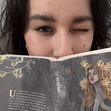Alexandra García Galván's Blog, page 6
May 17, 2018
Book Review: Someone Else's Fairytale by E.M. Tippetts
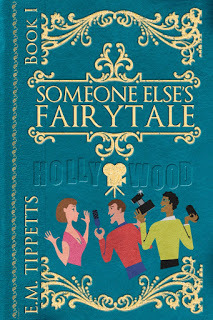
Previously posted on Goodreads!¹
★★★★☆
This is, indeed, a lovely modern fairytale.
What I liked about this book is that, apart from the love story, we can also see a GOOD background of the protagonist and you can understand perfectly why she may seem a bit cold (the best part is that she isn't) and even confused in some cases. Chloe is definitely a nice example of how a woman should be written. She had strong walls surrounding her, but she was still described as a mature, independent, and strong human being.
Jason is that kind of guy who gets what he wants without trouble...until he meets Chloe. The important thing about his is that he realizes this is some point of the book, showing that even if you're the most perfect superstar in the eyes of everyone, you can be one of the most insecure persons on Earth.
I'm not so fond of the ending, it was quite predictable, but I really enjoyed reading it.
¹This review was written and originally posted on my Goodreads profile in 2016. It might now present minor changes in structure or corrections, but has not changed its intention.
Published on May 17, 2018 01:00
May 15, 2018
Alexandra, The Dorky Writer - Chapter 5

The Dorky Writer already knew which path to choose, but the old fairies in the woods advised her to take the left side of the fork instead. Both of the paths looked different of course. One of them was full of fruity trees that whispered soft words to her, telling her that the answer could be there, while the other didn't look terrifying but had just some scattered and sad bushes waiting for some attention. That's where the fairies told her to go, but why? She wouldn't have enough food or water to survive."There will be hard moments for you, but the further you travel, the easier will be for others to follow. Keep going further, and then more dorky writers like you can pass through both paths with no problem later." "That sounds wonderful and everything, but that would let me weak for the moment I face The Mighty Thesis," The Dorky Writer said after she put her notes, some ink and quills in her bag."And that's where you'll know if you're worthy to win or not."
I was very afraid to tell a teacher about the idea I had for the thesis, because saying something about it would make it more real. The thing is that way before we discussed about it, another idea came up, an idea I also liked and that I hadn't considered it. So when the real moment to discuss the subject of investigation arrived, I had two ideas instead of one but with no problem to start.
Every thesis is born because of the need to know something or to answer a question related to the subject of investigation, and this need is called a problem. My problem was that that problem wasn't actually clear, of course. I doubt it, but if you read the first chapters of this insanity, I was kinda sure to talk about women's memoirs and how different they are from one to another. Hell, I already had an idea of what to read but I stopped because of my lack of money to get the books (a downfall of not having good libraries here). The thing is that in another class, before taking the first Thesis Seminar, I mentioned something related to fan fiction. I don't really remember how and why I mentioned it, but my teacher said that investigating about that would be very awesome and different because it was related to my specialization, which is Creative Culture. I have to remind you that this teacher, who is the principal of the school too by the way, didn't know about the idea I already had in mind.
So, the weeks went by, I couldn't write a thing in here again but book reviews, another kind of writer's block I suppose, and then the first Seminar arrived. I mentioned that I had two ideas and between the teacher-principal, who was acting as a substitute for that session, and my classmates, advised me to take the fan fiction subject and find a problem, find a reason why I should defend it, because there are a lot of similar works related to comparative texts (women's memoirs in my case) as written final works.
After that session, ok, why, oh God, why do we have to share these thoughts out loud? My anxiety kicked me out right on my head! my mind was so crowded I had to hide my school notebooks and books under the bed and I better started to clean so I could keep my mind focused on something else. I couldn't even tell my boyfriend or my mom about it, no matter how much I needed to talk about it with anyone because I wasn't really sure what was going on. Had I really chosen an unexplored and almost empty path? I know it's not completely empty, I mean, there are a lot of trails inside that are full of wonderful written fics but I'm going to go beyond that. And I'm more than scared.
This work has changed and it has changed completely... and I haven't actually really started! I think I have a tiny question that demands to be answered, but it won't become real until I talk with the actual teacher of the Seminar. Until then...
End of Chapter 5.
Published on May 15, 2018 20:53
May 13, 2018
Book Review: Hardened Hearts [edited] by Eddie Generous

★★★★☆
When we think about love stories we always end up thinking about flowers and chocolates, about kisses and walks during a warm sunset. Happy endings. But the line between love and horror is as thin as the single page of a book.
Hardened Hearts caught my attention since the very beginning with the foreword by James Newman, which reminds you that, indeed, love isn't easy, that makes you bleed and hurt and rage. I think that Newman wrote the perfect book summary: They are stories about sexual love and love between star-crossed romantics, but also included here are stories of a guilt-ridden father's love for his little girl, obsessions with inanimate objects, and even one woman's unnatural, and shared, love for a spider (!).
Love is strange...
I almost wrote this review in a different way, focusing on each story, but then I thought that I could end up spoiling some of them, because WOW! They were 3 of them especially that I'll totally reread whenever I have the chance! What I can say about it, is that this is one of those books that you can't put down easily. I had to, because of work and school, but it's not like the stories left my mind, really. There was one story that reminded me of my first heartbreak, there was another that made me feel terrible and hoping it would never happen to me, and another one that made my jaw drop because the ending wasn't what I was expecting.
Hardened Hearts tells you about self-love, love after death, sexual love, family love, broken hearts, and maybe some kinky love (WOMAN, A SPIDER, REALLY? Ha ha, sorry, my fear is speaking here); its characters are varied and inclusive, full of fear and doubt but some kind of hopeful as well, so I think almost everyone can feel identified with at least one of their sentences.
The writing of all of them was impeccable and dark, and for some stories, I was left wanting more. If there's a chance to make a Volume 2 of this, please, don't hesitate to make another compilation!
The authors you can find in here are:
Gwendolyn Kiste
Somer Canon
Calvin Demmer
Theresa Braun
John Boden
Tom Deady
J.L. Knight
Madhvi Ramani
Scott Hallam
Robert Dean
Leo X. Robertson
Jennifer Williams
Erin Sweet Al-Mehairi
Sarah L. Johnson
Meg Elison
James Newman
Eddie Generous
The only reason I gave this book 4 stars is because there are some stories with explicit sex, drug abuse or rape. I don't mind the topics, I've read them in other stories, but I think is important for other people that might feel threatened by these. Please be careful when reading or recommending this book.
I could read this book thanks to author Theresa Braun and Booktasters ;)
Published on May 13, 2018 19:13
May 10, 2018
Book Review: Jane Eyre
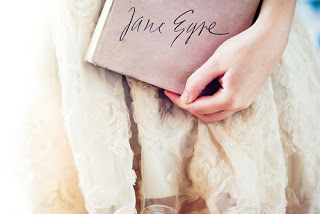
Previously posted on Goodreads!¹
★★★★★
This book... this book...
It took me ages to finish because I was reading it on my laptop, thing that now assures me that if I want to read e-books, I must buy a proper e-reader.
The writing style reminded me a bit of Charles Dickens' David Copperfield, because he started telling the story as a boy and we, as readers, were growing up with the main character all along; it has both ups and downs, sometimes you're reading catastrophes and sometimes long periods of joy.
Charlotte Brontë wrote down perfectly the role of a well-educated and at the same time passionate girl who never gave up in the dark times of her life, thing that I admire because in the books I've read recently, I see female main characters crying and laying down, sometimes being reckless in que subsequent actions because their lives are just not worthy enough. Jane Eyre is completely different and shows that even in different ages, women can be as strong as men and even stronger in love situations.
SPOILER ALERT!
Oh, Rochester. The man made me want to throw the book and cry because of his secret. There were times I didn't believe in his love for Jane and everything seemed suspicious for me. Even though, I felt that Jane wasn't going to feel completely happy without him, I understood that with her relationship with St. John, and if she had chosen him instead of Rochester, I would've hated this book forever. (I reckon my ship in this book is very clear).
END OF SPOILERS!
¹This review was written and originally posted on my Goodreads profile in 2013. It might now present minor changes in structure or corrections, but has not changed its intention.
Published on May 10, 2018 01:00
May 3, 2018
Reseña de libro: Juego de tronos de George R.R. Martin
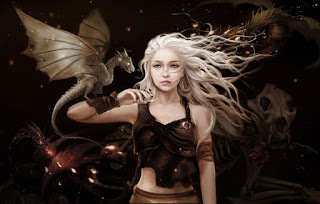
¡Entrada original en Goodreads!¹
★★★★★
Que libro tan increíble.
Debo decir que al principio fue difícil para mí porque tiene muchos nombres y porque no estaba acostumbrada a tener tantos personajes principales, así que, en mi humilde opinión, eso fue lo que hizo que la historia fuera muy diferente a otras que he leído.
La obra no puede ser mejor, tiene una mezcla de referencias medievales y mágicas, y el desarrollo de los personajes hace que todo sea muy real.
¡ALERTA DE SPOILERS!
Mi favorita por mucho fue Daenerys Targaryen, por su historia, su personaje, todo. Solo era una niña de 13 años que tuvo que convertirse en mujer para salvar su linaje, y cambió de ser una niña miedosa y maltratada a ser una mujer sabia y valiente con más pantalones que Joffrey Baratheon. También amé a Tyrion Lannister, porque demostró que tiene el nombre de los Lannister, pero no sus ideas, lo que lo hace un personaje fuerte y centrado.
¡FIN DE LOS SPOILERS!
Necesito saber qué sigue. Desafortunadamente, necesito ahorrar dinero primero y mantenerme alejada de lo que me puede echar a perder la historia.
¹Esta reseña se escribió y publicó en mi perfil de Goodreads en 2013. Puede que ahora presente pequeños cambios en estructura o correcciones, pero no ha cambiado su intención.
Published on May 03, 2018 01:05
Book Review: A Game of Thrones
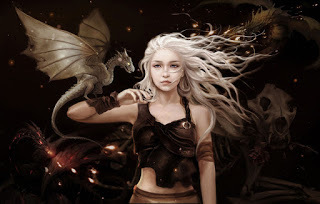
Previously posted on Goodreads!¹
★★★★★
What an incredible book.
I must say that it was difficult to me at first because it has too many main characters, so in my very humble point of view, that's what made this story different from others I've read.
The work can't be better, it has a mix between medieval and magical references and the character developments make everything very real.
SPOILER ALERT!
My favorite above all was Daenerys Targaryen, her story, her characters, everything. She was only a 13 year old girl who had to become a woman in order to save her lineage, and she changed from a frightened and bullied girl into a wise and brave woman who'd have more pants than Joffrey Baratheon. I also loved Tyrion Lannister because he demonstrated that he had the Lannister name, but not their ideas, something that makes him a very strong and self-centered character.
END OF SPOILERS!
I need to know what's next. Unfortunately, I need to save money first and stay away from spoilers.
¹This review was written and originally posted on my Goodreads profile in 2013. It might now present minor changes in structure or corrections, but has not changed its intention.
Published on May 03, 2018 01:00
April 26, 2018
Book Review: The Evolution of Mara Dyer by Michelle Hodkin
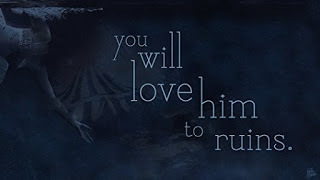
Previously posted on Goodreads!¹
★★★★☆
Ok, I'll probably change my rating another day, but today, it'll be like 4.5ish. The thing is, I think I loved it because this is the first book in months that made me want to read at 2 a.m. (I missed that), but at the same time it was like "OMG, this entire plot is making me crazy and angry."
I like how everything's written, even though is told in a space of one-two weeks; it's direct and the author makes you feel exactly as Mara, you just simply want to scream at her family and make them understand, but NO :) So, well done, Michelle!
Now, the things I didn't like: I didn't make a review of the first book, but my opinion about Noah hasn't changed, I just like him a little bit maybe because I'm sick of the same stereotype of boys in young adult books: handsome, with the need of feel pain, and the money that helps with everything.
SPOILER ALERT!
So I didn't suffer when the possibility of his death came.
END OF SPOILERS!
Don't take it wrong, I like that he's the catharsis in Mara's life, I even love that is not only a catharsis in a metaphoric way.
Dr. Kelly was a nice revelation as Jude's accomplice, also there was a special something that made this book even more magical and mysterious, so I want to read the next one immediately.
All I know is that it was a mistake reading it now, because I have to wait a lot for the uncountable questions I now have. Dammit!
¹This review was written and originally posted on my Goodreads profile in 2014. It might now present minor changes in structure or corrections, but has not changed its intention.
Published on April 26, 2018 01:00
April 20, 2018
Sobre los textos religiosos
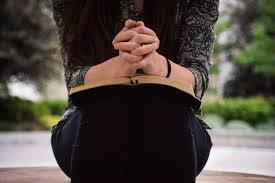
En una de mis clases de la maestría nos han pedido que redactemos sobre lo visto en clase para que poco a poco vayamos adquiriendo un estilo propio al momento de escribir, de manera que uno diga “Ah, esto lo escribió tal”, o algo así se mencionó. Pues bien, esta es mi manera de escribir, casual, no rimbombante y de manera errante. Este es tal vez un enfoque equivocado, pero tengo que deshacerme de este writer’s block al menos en esta tarea.
Antes de abordar el tema, se suponía que cada uno leeríamos un capítulo del Libro Judío y al final todos leímos el mismo. El texto que escogimos fue Geografía urbana y palabra impresa, y en él pudimos leer sobre el creciente número de bibliotecas especializadas sobre libros judíos en Argentina en las primeras décadas del siglo XX.
Tanto en la urbe como en las pampas, los recién llegados se agruparon para no perder sus raíces, evitar el aislacionismo y compartir tanto penas como esperanzas. Crearon instituciones sociales, culturales, educativas, políticas, laborales, socio-deportivas y religiosas.
En lo que se refiere a las bibliotecas, era difícil establecerlas por la falta de fondos para comprar los primeros libros. Sin embargo, hubo un cambio favorable en la circulación de ejemplares en la posguerra, ya que hubo una baja en los precios de libros importados. Se destacaron autores como Tolstoi, Gorki, Nietzche y Dostoievski, y entre los géneros importantes se encontraban los cuentos, novelas, libros de historia, de antisemitismo y de filosofía.
Con el paso del tiempo y debido a la cantidad de judíos en el área, Argentina fue el hogar de las editoriales judías Zlotopioro Hermanos y Julio Kauffman. Sin embargo, no se podían tener publicaciones periódicas en ídish; además de necesitar tipos hebreos, necesitaban de correctores capacitados que le dieran un visto bueno al trabajo, por lo que muchas otras editoriales se dedicaron en publicar en castellano.
Al contrario de lo que los judíos en Argentina buscaron hacer (que los jóvenes se cobijaran con la cultura de sus ancestros), y dando un poco un giro, pudimos ver ejemplos de aquellos tiempos en que la difusión de lo impreso tenía sus limitantes (en vez de que alguien se cobijara de una cultura, tenían que adoptar solo aquello que era moralmente aceptable).
Como ejemplos vimos la época de las cruzadas, en donde se empiezan a difundir libros populares, como los de las historias caballerescas, las cuales se llegaron a considerar como historias prohibidas debido a que esos textos relataban fantasías y no realidades como lo era en aquel entonces la Biblia y sus textos paralelos (plegarias, oraciones).
Los textos religiosos han sido un mecanismo de control de las masas, han dictado lo que está bien y lo que está mal a lo largo de la historia, prácticamente dicen la manera en que uno debe vivir y hasta lo que se debe pensar. Tomando textos de la iglesia católica como ejemplo, ya que desconozco del contenido de textos de otras religiones, considero buenos apartados a los diez mandamientos, los actos de contricción para aquellos que no hayan seguido estas reglas y la manera en que debe venerarse a Dios.
Acto de contricción 1 (porque claro, depende del tipo de pecado cometido):

Suena fácil llegar al perdón, pero hay un truco: para llegar al perdón absoluto, se tiene que hablar con un intermediario, el sacerdote, relatar los pecados cometidos o los sentimientos de culpa, recibir una penitencia y finalmente recibir una absolución. El poder recae entonces en una persona terrenal y no en un ser celestial. ¿Será acaso que la iglesia católica se haya dedicado a aprovecharse de este pequeño detalle a lo largo de la historia? Aun así, a pesar de la rigidez de la iglesia para con feligreses, resulta interesante como es que el dogma de esta y otras religiones, que siguieron por siglos un texto sagrado por tantos años prácticamente al pie de la letra, se hayan visto en la necesidad de aceptar que la biblia no se trataba solamente de historia, sino que era necesario que las personas pudieran distinguir entre lo real y lo imaginario, así como también llegar a un análisis de lo descrito.Las siguientes definiciones y ejemplos, fueron tomados de la página oficial de los Testigos de Jehová (2018):
En las metáforas y símiles suelen compararse dos cosas. Por un lado está aquello de lo que realmente se habla, el término real; y por otro, aquello con que se lo compara, el término imaginario. Y lo que ambas cosas tienen en común lo llamaremos punto de comparación. Así que la clave para entender estas figuras es saber identificar estos tres elementos.

Es claro que con la cantidad de información que hay en nuestra época es difícil controlar a las masas de la misma manera en que se hacía antes. El miedo a Dios que se infundía anteriormente no es el mismo de ahora y hay mucha gente que incluso de manera motivada desafía todo lo que sigue siendo moralmente bueno. Pero, quién sabe, a lo mejor en algunos años algún libro perdido de la Biblia aparecerá, hará una mención sobre un manto pintado de los colores del arcoíris y nos tocaría a nosotros encontrar la figura retórica, el término real… Pensándolo bien, probablemente ya apareció y se encuentra ya hecho cenizas, cual alma pecadora en el infierno.
Bibliografía:
Testigos de Jehová: https://wol.jw.org/es/wol/d/r4/lp-s/2... Judía Amia: http://www.amia.org.ar/index.php/cont... Católico: http://www.rezarelrosario.org/conteni...
Published on April 20, 2018 16:13
April 19, 2018
Book Review: Rising by Holly Kelly

Previously posted on Goodreads!¹
★★☆☆☆
I really, really, really wanted to like this book, it just wasn't for me.
I wanted to read this book after I read the plot and saw the cover; also I was happy because I found it free on Amazon. I'd never read a book about mermaids/dagonians, I hadn't read about Greek myth actually, and this has a little of it, for instance you find names like Triton who has an important part in this story and Poseidon.
I was so disappointed, though.
The book starts with the plot that Xanthus wants to avoid a war between humans and Dagonians, but you don't actually see a lot of that. I was really excited when I read that there were several deaths of these creatures because of the human behavior with the environment! You don't see that often in a fantasy book, but the story is more focused in the love part, I mean, it was kind of obvious that it was going to happen, but still, I believe it needed to be deeper. But what was more important to me, well, it is with all the books I read, is that the narrative was too simple. There were characters that I believe were unnecessary (but I think it's because there's another book and the characters can be explored then (?)), their development wasn't enough, and something was resolved pretty easily.
SPOILER ALERT!
Everything about Triton and Sara was just UGH! NO THANK YOU! I realized she was his daughter in seconds, and then he saves the day in a very easy way, a way that destroyed everything that was already destroyed, NO THANK YOU.
END OF SPOILERS!
Also, I am aware that if I would've read this in my teenage years, I would've love it, because in that time I had an incorrect idea of what a healthy relationship is, and Xanthus is, for me, a total Edward Cullen. He's overprotective, obsessive, and controller towards her girlfriend... so, the only difference I could find was that he's got a fin. A lot of people believe that this is the perfect relationship... well, I won't go into this!
There was at least a moment where Sara tells Xanthus that it is important for all women to also share their opinions! Maybe that's why I gave another star.
¹This review was written and originally posted on my Goodreads profile in 2015. It might now present minor changes in structure or corrections, but has not changed its intention.
Published on April 19, 2018 01:00
April 17, 2018
Book Review: Ann, Not Annie by Sage Steadman
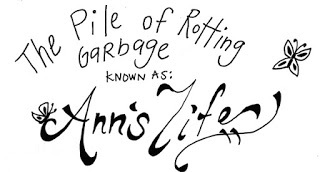
★★★★☆
Not till we have lost the world, do we begin to find ourselves.Henry David Thoreau
The first thought I had when I finished the book was HELL, YEAH!
This book was awesomely written. The irony, the vocabulary, and the descriptions provided by the characters and the narrator fit perfectly for all situations. Plus, the idea of having a narrator as a very close person to the main character gives you a more personal approach, which makes you feel familiar and sympathetic.
The thing that surprised me the most was the story behind what I read in the synopsis. When I read it, it seemed quite simple, I honestly thought this would be a very basic book about teenage love and I'm very pleased to say I was very wrong.
Ann, Not Annie tells us accurately how it is for a teenager to have an alcoholic parent and the role that sometimes children have to take so they can have some order in their lives; a thing that isn't right, a thing that hurts, and wow, that was incredibly well-described. I can give it credit, because I've been in the same situation.
More pros about this book are definitely its characters, they all had something that made them be unique in their own way, the drawings were an interesting addition, and I think adding the use of intertextuality with Walden was quite smart. I've always liked to have more texts to read later, that also gives you an idea of how an author gets their inspiration, which is more than cool!
The thing that gave this book 4 stars instead of 5 was the pace at the end. I felt it was faster compared to the first chapters. There are a few typos as well, but I think I shouldn't criticize that because English isn't my mother tongue and I know I don't write it perfectly.
I could read this book thanks to the author and Booktasters ;)
Published on April 17, 2018 16:42

